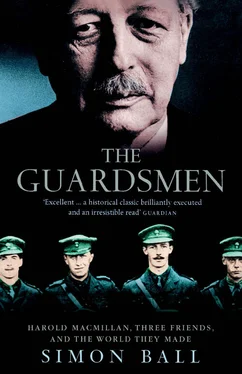Lyttelton and the others should have been dead men. If the Germans had simply used their rifles to pick off the fleeing British it would have been a massacre. But, with adrenaline pumping, they continued their charge. Eight hundred yards was twice the distance a man can sprint. To run the distance over rough ground was lungbursting. Their salvation was the lack of artillery fire. Vision was not obscured, as it usually was, by smoke. As the remnant of Colquhoun and Lyttelton’s forlorn hope fled towards the British line, the Guards in the front trenches could see their plight: they opened up concerted fire on the pursuing Germans, who either died or fled. Even so over forty of the sally were either killed or wounded – although observers considered these casualties ‘astonishingly low’ given the circumstances. 151
If it is possible to talk of a day changing men’s lives then 15 September 1916 was that day for Lyttelton, Macmillan and Crookshank. As night fell, Macmillan and Crookshank were cripples, Lyttelton was a hero. 152 In retrospect, to dare such things and survive appeared to him the very acme of pleasure. ‘The 15th was the most wonderful day of my life,’ he wrote. ‘I drank every emotion to the dregs and was drunk. It was superbly exhilarating.’ ‘About 2 a.m.’ on 16 September ‘I was sent for by Brigade HQ to report on the situation. Unfortunately the orderly lost his way – very naturally, it being as black as your hat – and did not get there until about 4.30 or 5. I was given a whisky and soda and went to sleep on my feet. The brigadier kept me at his HQ until the relief so I do not know much more.’ He could bask in his ‘name’ – he was awarded the DSO for his conduct in the battle. It had been a ‘wonderful show’. 153
These, however, were the sentiments of one who had miraculously emerged unscathed. Macmillan, by contrast, would never recover sufficiently to play an active role in the army. During his brief military career, he had been shot in the head, the face, the hand, the knee and in the back. He barely survived the last wound. His right arm and left leg never worked properly again. Over the same short period, Crookshank had been buried alive, shot in the leg and blown up. It was horrifyingly apparent that he would never father children; it took him a year to recuperate, and even then he had to wear a surgical truss for the rest of his life. As in 1915, therefore, Lyttelton alone was left at the front.
Lyttelton had experienced an intense emotional high at the Somme, though in reality the life of discomfort and danger was beginning to pall for all the officers in the division. When during the spring of 1917 Lyttelton revisited the trench he and his band had reached on 15 September, he was much less sanguine: ‘this country stinks of corruption’, he noted in disgust. ‘As far as the eye can reach is that brown and torn sea of desolation and every yard there is a grave, some marked with rifles, others with crosses, some with white skulls, some with beckoning hands. But everything is dead: the trees, the fields, the corn, the church, even the prayers of those that went there in their Sunday clothes with their sweaty pennies for the plate: it is all dead and God has forsaken it.’ 154
The 3rd Battalion was not used again at the Somme because it had lost over three quarters of its officers and had ceased to function as a serious fighting force. The survivors were sent back to Paris to enjoy the high life. The Parisian hoteliers were doing their bit for the war effort while maintaining the social exclusivity of their clientele. ‘At present I am wallowing in the luxury of this place,’ Lyttelton wrote from the Ritz. ‘Everything is done wonderfully well…all for 10 francs because we are officers in the Brigade.’ After the Ritz the life of the front-line infantry officer held few attractions. 155 ‘I think I should quite like a change,’ Lyttelton, back at the front, told his mother, ‘when I wake up in the morning and see a vignette of the Somme battlefield communications through the bellying flaps of my tent and mud, mud, mud.’ 156 His former boss and current corps commander, Lord Cavan, agreed with him. At the beginning of November 1916 he ‘mutinied’ and refused to send his men into the attack once more. ‘No one who has not visited the trenches,’ Cavan said in a swipe against chateaux-bound staff officers, ‘can really know the state of exhaustion to which the men are reduced. The conditions are far worse than the first battle of Ypres, all my General officers and staff officers agree that they are the worse they have seen, owing to the enormous distance of the carry of all munitions – such as food, water and ammunition.’ 157 At the same time as the Somme offensive ground to a stop in the winter mud of northern France, Oliver Lyttelton was applying for a job as a staff captain.
For much of their lives Lyttelton, Crookshank, Macmillan and Cranborne had marched in close step. At Christmas 1916, however, they were operating on entirely different time-scales. Crookshank and Macmillan, lying in London hospital beds under the watchful eyes of their mothers, could barely think about more than one day at a time. For them survival was victory. Crookshank’s wound was horrible, but Macmillan’s was more life threatening. He had received inadequate initial treatment: the wound became infected and the bullet was still lodged in his body. Crookshank was declared fit for ‘very light duty’ six months after the Somme at a time when Macmillan’s recovery was still in doubt. 158
Cranborne, on the other hand, was looking forward to the bright horizon. His wife had just given birth to a son, thus securing the Cecil succession for another generation. 159 Acquaintances urged him to take up his rightful position in national life. ‘God knows,’ one star-struck admirer wrote, ‘there will be need of all straight men who have no axe to grind after this war is over…the country has need of you and your obligation to its service did not begin and will not end with the War.’ 160 He was starting to put out feelers about opportunities in the two civilian careers he was eventually to follow – the City and politics. 161
Lyttelton was looking ahead a few months. He knew ‘the one job I really would like, which is staff captain of one of the three Guards brigades’ and was manoeuvring to achieve it. 162 To get a good post outside the regiment, one had to attract the attention of a senior officer, either through connections or by personal conduct. When Lyttelton stumbled into the headquarters of 2nd Guards Brigade to report on the events of 15 September he was taken under the wing of Brigadier John Ponsonby, an officer who ‘broke most of the rules and refused to take life too seriously’. 163 Although Ponsonby was a Coldstreamer he was another character like the Grenadiers Jeffreys, Brooke and de Crespigny. He had a very bad speech impediment that set for his staff a challenging task of translation, and he refused to wear any head protection, favouring a pith helmet instead. Ponsonby and Lyttelton were to become firm friends. Both had a taste for the high life in the Ritz and the casinos of Paris. 164 Ponsonby certainly had no objection to Lyttelton parading his new mistress – ‘a French lady married to an American officer in the flying corps…[who] belonged to the substantial (and I don’t mean fat) type’ – in either venue. 165
Lyttelton returned to Flanders in April 1917 to prepare for the battle of Passchendaele as a fully fledged brigade staff officer. His duties were mainly involved with the organization of logistics. The work was important but routine. His most exciting moment came when he had to take a mule train up to resupply the 3rd Battalion Grenadiers under heavy shell fire. His former comrades subjected him to much ribbing about a member of the ‘gilded staff’ being reduced to a humble muleteer. 166 Once again the experience of the Guards differed from other parts of the army. Used as an assault force, the Guards Division achieved a brilliant tactical success in crossing the Yser canal and seizing most of its objectives east of Boesinghe at the beginning of the battle on 31 July 1917. Their attempts to learn from the Somme through intensive training on mock attacks thus paid off before Passchendaele degenerated into ‘an almost impassable quagmire’ and ‘pursued its dreary and exhausting course’ to eventual failure. Before the offensive, Lyttelton had dared to hope that the Germans were cracking – it was ‘not all we take in the way of ground or even of prisoners, but it is they allow them to be taken…if in two months the submarine campaign is no better for them, they will chuck it’. 167 The vision of endless mud and seemingly endless war was a crushing disappointment even for those like Lyttelton who believed in the ‘battle of attrition’ – ‘the Hun when we have a few young Somme offensives going in the spring hasn’t an earthly’. 168 Yet although Lyttelton’s hopes of victory were dashed, his interest in soldiering was sustained by his continued hopes for promotion.
Читать дальше












